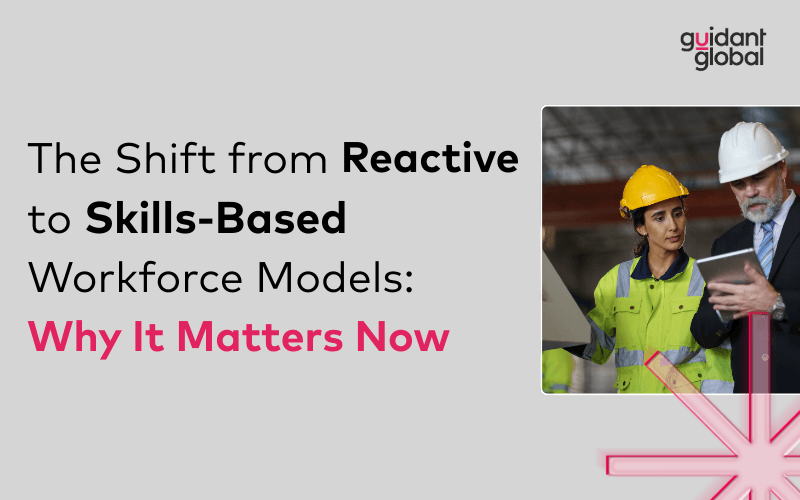

Author
Client Solutions Architect
3 minutes
The Shift from Reactive to Skills-Based Workforce Models: Why It Matters Now
Organisations are reimagining the way they approach workforce management, with the traditional, reactive models that once dominated, giving way to skills-based workforce strategies. This is unlocking new potential for growth, adaptability, and competitive advantage.
From reactive to skills-based workforce strategies
Traditional reactive workforce models focus on addressing immediate talent and skills needs as they arise, often leading to short-term fixes and inefficiencies. This approach can leave organisations one step behind the curve, giving competitors that are thinking one step ahead a strategic advantage
In contrast, skills-based strategies take a proactive approach—identifying, nurturing, and leveraging the precise competencies aligned with both current and future organisational goals. By emphasising continuous learning, adaptability, and strategic alignment, companies can move beyond merely filling gaps, building a resilient workforce primed for long-term success.
This approach can also make organisations more attractive to future talent, with the current workforce increasingly equally focused on long term opportunity, learning and upskilling, as well as money and benefits.
Why shift now? Industry insights and statistics
-
81% of organisational leaders agree that adopting a skills-based approach propels economic growth through improved productivity, innovation, and agility.
-
95% believe it represents the dominant recruitment trend for the future.
-
55% of organisations worldwide have already started transitioning to a skills-based talent model, with another 23% planning to begin this year.
-
Leaders highlight key benefits, including increased access to job opportunities for employees (82%), higher workforce equity (72%), and reduced unemployment (61%).
What are the advantages of a skills-based workforce model
-
Alignment with strategic goals: By mapping and nurturing skills in sync with organisational priorities, companies create a workforce tailored for sustainable, long-term success.
-
Proactive workforce planning: Anticipating future skill needs diminishes dependence on urgent, stopgap measures.
-
Enhanced adaptability: A flexible, skills-oriented workforce readily pivots to meet shifting market demands and emerging industry trends.
-
Continuous learning and growth: Ensuring a culture of upskilling and reskilling ensures that employees remain competitive and engaged.
-
Efficiency and resource optimisation: Targeted training closes skill gaps and directs resources where they have the greatest impact.
-
Improved employee retention: Investing in professional development boosts job satisfaction and loyalty.
-
Stronger talent acquisition: Skills-based recruiting attracts candidates aligned with the organisation’s commitment to personal and professional growth.
-
Becoming a visionary ‘employer of choice:’ By prioritising professional development and growth pathways, employers can become as a destination for top talent—earning a reputation as an 'employer of choice' in a competitive landscape.
In addition, skills strategies enable companies to upskill, train, and support employees' career development, as well as tap into the expertise of an aging workforce for mentorship and knowledge transfer.
For forward-thinking organisations, skills-based workforce strategies offer a roadmap to greater efficiency, organisational agility, and a culture of innovation. By focusing on competencies rather than credentials, companies can streamline hiring, address skill gaps, and adapt to evolving industry needs—positioning themselves to thrive in an increasingly competitive market.
Ready to shift to a skills-based workforce model?
Unlock deeper insights and actionable strategies—download our guide Transforming Workforce Management Strategies: From Reactive Models to Skills-Based Excellence today.
Discover how to future-proof your organisation, drive continuous growth, and foster a workforce ready for tomorrow’s challenges.
Insights to drive workforce performance
Workforce insights in your inbox
Sign up for our newsletter with the latest workforce management news, insights, analysis and more.
Australia
Suite 1403, Level 14
309 Kent Street
Sydney
NSW 2000
United Kingdom
United States
27777 Franklin Road
Suite 600
Southfield
Michigan 48034









